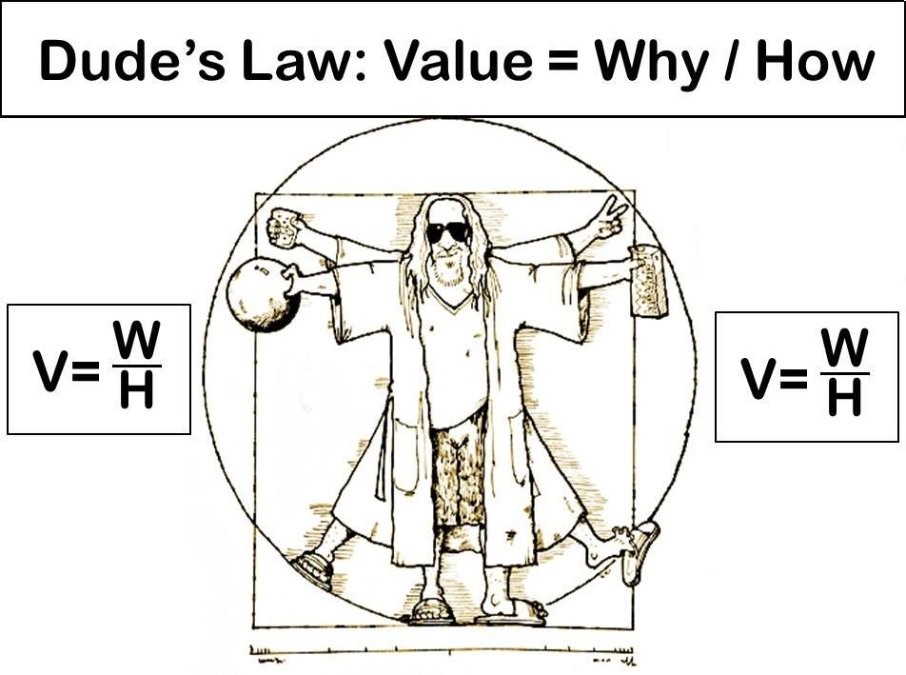The Dude Abides
The Big Lebowski is a cult classic from the late 90s. It’s all about Jeff “The Dude” Lebowski and a series of events and (mis)adventures that happen to and around him. There are many quotable lines, but one of the most quoted, one that shows up on posters, shirts, memes everywhere, and is the last line The Dude says in the movie, is “The Dude abides.” It’s a paraphrase of a line in Ecclesiastes
One generation goeth, and another generation cometh; but the earth abideth for ever.
Things change. Generations come and go. But the Earth abides. It doesn’t go away. The same with The Dude. Despite everything that happens in the movie, The Dude goes on as he is. Accepting life. Calmly enjoying it. Going bowling and drinking white russians.
Which brings me to today’s topic, Dude’s Law.
Value = Why / How

Dude’s law was coined by David Hussman, and he explains it in this short video. Dude’s law is simple. The value of doing something is proportional to why you’re doing it, and inversely proportional to how you’re doing it. For any give why/how pair, if you double the why you get twice the value. If, on the other hand, you double the how, you get half the value.
That’s pretty non-denominational, so let’s try to be a little more specific. Why measures the benefit. The thing you want and get more of. It’s based on the reason you’re doing something. It helps you to quantify the good things that happen if you do whatever it is. How measures the cost of doing it. That includes time, effort, money, and any other resource you put into doing the thing. Or talking about doing the thing.
It’s still pretty non-denominational, but at least now, value is benefit / cost. That’s a fairly common definition, and something that’s easy to get behind.
The important thing to remember here is that value is inversely proportional to the how, and the how in Hussman’s explanation includes time spent discussing how. If you spend too much time talking and thinking about how and don’t improve the how by enough, you’ve actually reduced value. An obvious example of this is XKCD’s Is It Worth The Time. Automation can help, but if you spend more time automating that the automation will save you then you haven’t added value.
It’s another local vs global maximization tradeoff. Consider making a technology choice for the next feature. You’ve got a system that was built using Go. There’s a cool new feature in Rust that you could use that would make the task easier. But the team doesn’t know Rust and the development environment doesn’t support Rust. The higher the how, the less value you create. So without changing the why you probably shouldn’t choose Rust in this case.
Unless… you also change the why. If there’s a good reason to move the entire system to Rust things are different. If your why goes up at the same rate as the how, then the value is not reduced. In that case, the higher how is justified by the higher why.
So yet again, we come back to it depends. Which is just another way of expressing Dude’s Law. Value is benefit / cost. That doesn’t change. It’s up to you to define why and how.
